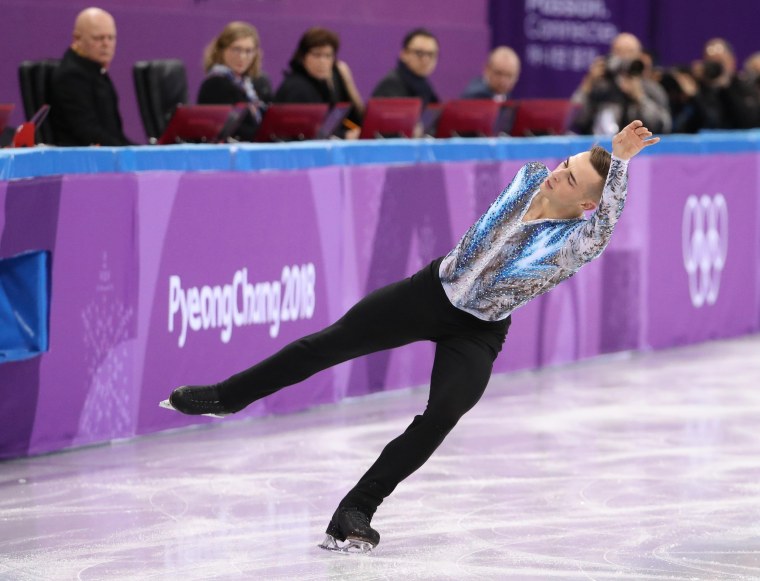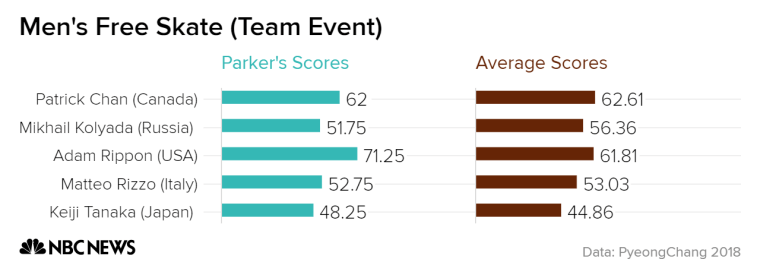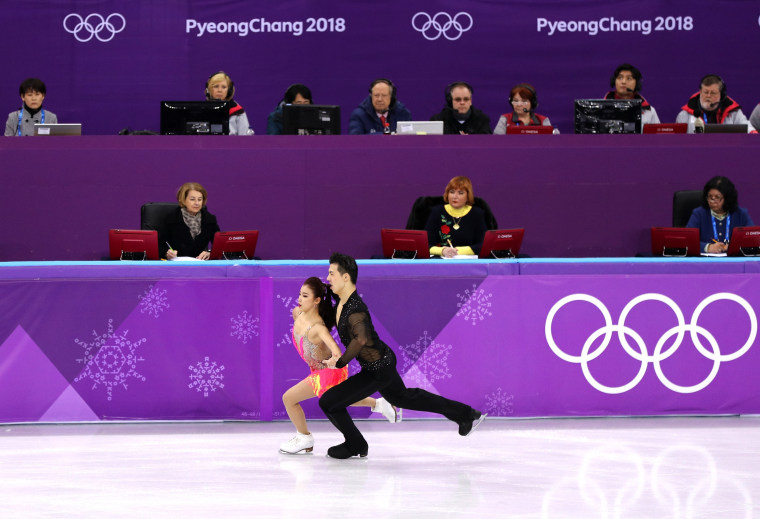When American figure skater Adam Rippon hit the ice in the team competition at the PyeongChang Olympics last week, Lorrie Parker of Morristown, N.J., liked what she saw.
Rippon skated well, with one misstep in a triple lutz during the free skate portion of the event. All nine judges factored that flaw into their scoring. But Parker, the lone American on the panel, gave Rippon a mark far higher than all but one of the other judges. Her score for Rippon's free skate was 15 percent above the mean for the panel of nine. Earlier in the short program, she also judged American skater Nathan Chen more favorably than all but one judge on the panel.
In two other international competitions in 2016 and 2017, Parker also gave American skaters higher marks than they received from judges of other nationalities, according to data reviewed by NBC News.

But none of this sets her apart from the rest of the figure skating judges at the 2018 Winter Games. In a previously published report, NBC News found that judges typically give higher scores to skaters from their own countries. The pattern is continuing at the Olympics, based on scores reviewed by NBC News and Dartmouth economist Eric Zitzewitz, who has spent 15 years examining national bias in figure skating judging.
Through Feb. 21, according to Zitzewitz, judges typically gave skaters from their homelands about five to seven points more than skaters from other countries during the longer free programs, a meaningful amount in a sport where total scores for top finishers range from 180 to 220. They were also likely to give lower scores than fellow judges to skaters from rival nations. Just minutes before Parker gave a high score to Rippon, she gave the Russian who preceded him on the ice, Mikhail Kolyada, the lowest score of all nine judges.
According to Zitzewitz, historical data indicates the Olympics may be the most biased of all international skating competitions. The pattern has continued at PyeongChang, and there is little reason to think it will change in Olympic skating's marquee event, the women's free skate, which begins Thursday night U.S. time.
"Clearly judges have not eliminated their nationalistic biases in the Olympics," said Zitzewitz. "The biases have gotten stronger, and they also are starting to take the form of penalizing other people's athletes."
Zitzewitz believes the bias is probably the result of the unique rules of ice skating. In skiing and gymnastics, for example, the international governing bodies choose the judges. Gymnastics also bars a judge from evaluating a competitor from his or her nation.
But in skating, the sport's governing body, the International Skating Union, does not pick which judges go to the Olympics. The national skating federations do. And individuals who serve or have served as top officials in their national skating organizations are allowed to serve as judges at international contests and to score skaters from their own countries.
"The judges are still picked by the federations, so think about what incentives that creates," said Zitzewitz. "Because the federation wants to win, they're going to pick someone who is going to help them out."
"You could think of it as the judges' incentives are to be biased rather than unbiased."
Before the PyeongChang games began, NBC News found one out of five of this Olympics' figure skating judges hold or have recently been at top positions in their nation's skating federations.

Lorrie Parker, for example, is a member of US Figure Skating's board of directors, but no rules barred her from judging Adam Rippon and other American skaters in both team men's events as well as the individual men's free program. In fact, in the individual men's free skate, she was the source of the highest scores that all three American skaters received. For Rippon, Chen and Vincent Zhou, that translated to up to 10.2 more points than the average judge on the panel.
The three other U.S. judges in PyeongChang showed the same scoring behavior as Parker – scores above the mean for American skaters, below the mean for rival nations, according to data reviewed by NBC News.
US Figure Skating did not respond to requests for comment and did not make Parker available for an interview.
The president of U.S. Figure Skating, Sam Auxier, is not judging in PyeongChang and had recused himself from evaluating recent high stakes international competitions. When he was the federation's vice president, he had judged at the 2014 Sochi Games.
The International Skating Union, the international governing body for figure skating, did not respond to requests for comment. Before the Olympics, the ISU said in a statement to NBC News that it has a "robust" procedure for monitoring judges, including penalties for over-marking skaters.
"The cancellation of anonymity makes it possible to trace not only the quality of judging," the union said, "but also any bias. Judges who make mistakes and/or are over marking skaters receive a warning and can be penalized by the ISU."
The union said it was a "priority to do its utmost to guarantee a fair result" during the PyeongChang Games.
The other judges
Parker was far from alone in the pattern of favoring those from her country. The other 40-plus judges from around the world tended to score their own skaters higher as well, according to scores analyzed by NBC News and also reviewed by Zitzewitz.
The scoring from the team and individual skating events through Feb. 21, with nine judges evaluating 226 performances, works out to more than 2,000 judges' scores to evaluate. This, said Zitzewitz, means his findings are statistically significant.
During the pairs competition, the Chinese judge, Feng Huang, awarded the highest scores to the eventual silver medalists, Wenjing Sui and Cong Han, giving scores a total of 6.75 points more than the combined average from the short and free programs. At the same time, Huang gave the lowest scores among all the judges to the gold medalists, Aljona Savchenko and Bruno Massot of Germany, more than 11 points below the average from the panel.
In ice dancing, the Turkish judge, Tanay Ozkan Silaoglu, gave Turkish skaters Alisa Agafonova and Alper Ucar their highest scores in both the short and free programs. If that was the prevailing score, the Turkish team would have finished in 13th place rather than 19th.
In the team ice dancing short program, the Chinese judge, Tianyi Zhang, generally gave lower than average scores to skaters until the Chinese pair, Shiyue Wang and Xinyu Liu, hit the ice. Then, the Chinese judge awarded the highest score of all the judges, 10 percent more than the mean. The Chinese pair finished seventh.
If all judges had given the same score as Zhang, they would have been fifth. And if all Chinese skaters got scores like that, it would have been good enough for the Chinese team to make it to the finals. Instead they did not make the final cut.
In the same team event, the Canadian judge, Leanna Caron, gave lower than average scores to most competitors. Her highest score, however, went to the Canadian team, Tessa Virtue and Scott Moir.

Outside of the team competition, Caron, who is also head of the Canadian national figure skating federation, consistently scored Canadian teams higher than the other judges. In the ice dance free skate, she scored Canadian pairs Kaitlyn Weaver and Andrew Poje and Piper Gilles and Paul Poirier higher than all of her fellow judges. She scored Virtue and Moir, who won the event, the second highest of all of the judges.
The team men's free skate also offered a window into how scoring can play out when judges are not evaluating a skater from their own countries. The Kazakh judge gave lower scores than most of the rest of the panel to all of the skaters in the competition. The Austrian judge gave higher scores to just about everyone. The Hungarian judge was consistently close to the average. None of those judges were evaluating skaters from their home countries.
To date, the judging at PyeongChang has not sparked the kind of controversy seen in other Olympics. Perhaps the most notorious incident occurred in 2002 at Salt Lake City, when a French judge admitted to colluding to help fix the pairs competition.